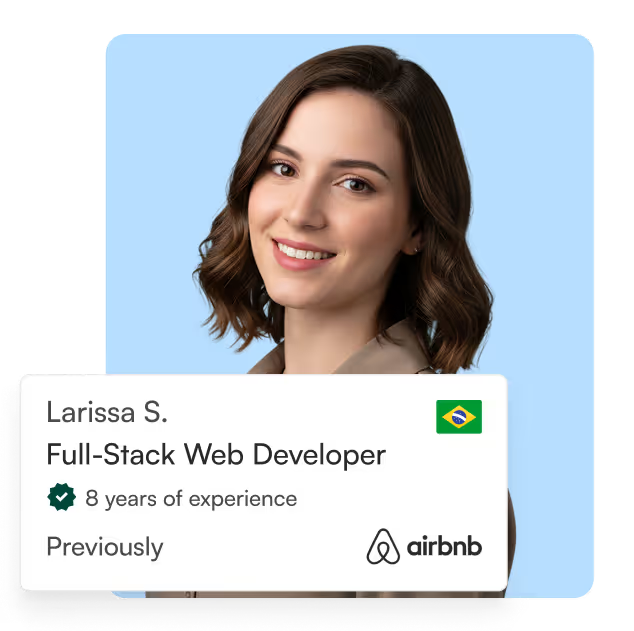20 Signs You Will Not Get the Job Offer, and What to Do Next


Lupa will help you hire top talent in Latin America.
Book a Free Consultation
Lupa helps you build, manage, and pay your remote team. We deliver pre-vetted candidates within a week!
Book a Free ConsultationWaiting for a response after a job interview can be an anxiety-inducing experience. You replay every moment of the conversation in your head, analyzing your answers and the interviewer's reactions, hoping for positive news. But sometimes, despite your best efforts, the signs point to a rejection.
While some rejections come as a surprise, others can be anticipated if you know what to look for. Recognizing the signs you will not get the job offer early can help you manage your expectations and continue your job search more effectively.
Remember that rejection is a normal part of everyone's career journey, but understanding these signals can help you better prepare for future opportunities.
{{rpo-embed}}
Signs During the Interview That Suggest Rejection
1. The Interview Was Unusually Short
When an interviewer cuts a meeting short—particularly if it lasts under 30 minutes for what should be a longer conversation—it often indicates they've already determined you're not the right fit for the position.
Typical job interviews for professional roles usually last between 45 minutes to an hour, allowing time to thoroughly discuss your qualifications, experience, and the details of the position. Some technical or senior-level interviews may even extend to 90 minutes or include multiple sessions.
If your interview wraps up in 15-20 minutes without covering substantial ground, it's one of the clearest signs you will not get the job offer. The interviewer may have identified a critical missing qualification or determined early on that there isn't alignment with what they're seeking.
2. The Interviewer Showed Little Interest or Enthusiasm
Body language and engagement level can tell you a lot about an interviewer's interest in your candidacy. Signs of disinterest include:
- Minimal eye contact or constantly looking at their screen/phone
- Checking the time repeatedly
- Appearing distracted or fidgeting
- Not taking notes during your responses
- Flat or unenthusiastic tone
In contrast, engaged interviewers typically lean in, maintain good eye contact, take detailed notes, and ask thoughtful follow-up questions that build on your responses. They'll often nod in agreement or show other signs of active listening.
If your interviewer seemed disengaged throughout the conversation, it's one of the common signs you will not get the job offer, as they've likely already made a mental decision about your candidacy.
{{consultation-embed}}
3. Your Responses Were Frequently Cut Off or Interrupted
When interviewers consistently interrupt your answers or quickly move to the next question before you've finished explaining your thoughts, it may indicate they've already made a negative assessment of your candidacy.
In a promising interview, the hiring manager will give you adequate time to complete your thoughts and may even probe deeper with follow-up questions. Interruptions that happen repeatedly throughout the interview suggest the interviewer is simply going through the motions rather than genuinely evaluating your potential contribution.
This pattern of interruption is particularly concerning if it happens when you're discussing your most relevant experiences or strengths. It's one of the telltale signs you will not get the job offer, as the interviewer isn't invested in understanding your full qualifications.
4. You Were Told You Lack Essential Qualifications
If during the interview, the hiring manager explicitly mentions that you're missing critical skills or experience required for the role, take this as a direct sign you will not get the job offer.
Statements like "We're really looking for someone with more experience in X" or "This role requires expertise in Y, which I don't see in your background" are usually honest assessments rather than negotiation tactics.
Interviewers who are genuinely interested in a candidate typically focus on strengths and potential rather than highlighting deficiencies. When they directly point out gaps in your qualifications, they're often providing transparent feedback about why you're not the right fit.
If this happens, the best response is to acknowledge the feedback professionally while briefly highlighting any transferable skills or willingness to learn. However, recognize that this direct feedback about missing qualifications is one of the strongest signs you will not get the job offer.
5. The Interview Focused Only on Reviewing Your Resume
When an interviewer simply walks through your resume without engaging in deeper discussion about your skills, cultural fit, or potential contributions to specific projects, they may be going through the motions of an interview they're required to conduct.
Promising interviews typically move beyond the facts already stated on your resume to explore:
- How you would handle specific scenarios relevant to the role
- Your approach to problem-solving
- Your working style and how you collaborate with others
- Your career goals and how they align with the position
If your entire interview consisted of surface-level questions about your work history without diving deeper, it's one of the signs you will not get the job offer. The interviewer likely didn't see enough potential to warrant a more thorough evaluation.
{{recruiting-embed}}
6. No Discussion of Salary, Benefits, or Specific Job Details
When interviewers avoid discussing compensation, work schedules, or specific responsibilities, it often indicates they're not seriously considering you for the position. Companies that are interested in a candidate typically want to ensure there's alignment on practical matters before proceeding further.
In promising interviews, you'll often hear questions or statements like:
- "What are your salary expectations for this role?"
- "Let me tell you about our benefits package..."
- "The role would require you to start on X date. Would that work for you?"
- "You would be working directly with the Y team on Z projects."
The absence of these practical discussions is one of the signs you will not get the job offer, as the company isn't investing time in selling you on the position or confirming logistical compatibility.
7. The Interviewer Didn't "Sell" the Company or Position
When interviewers are interested in a candidate, they typically make an effort to highlight the company's benefits, culture, growth opportunities, and what makes the position appealing. This "selling" aspect of the interview is crucial for attracting top talent in competitive markets.
Signs that an interviewer is selling the company include:
- Enthusiastically describing the company culture
- Highlighting growth opportunities and career paths
- Explaining why the team is exceptional
- Detailing exciting projects or challenges you would work on
- Discussing the company's mission and impact
If your interviewer made no effort to make the workplace sound appealing or didn't try to get you excited about the role, it's one of the clear signs you will not get the job offer. They likely don't see you as a potential team member worth recruiting.
8. You Were Labeled as "Overqualified"
Being told you're "overqualified" during an interview often masks other concerns. While it might sound like a compliment, it typically indicates the employer has reservations about:
- Your salary expectations exceeding their budget
- Concerns that you'll quickly become bored and leave
- Worries that you might expect rapid advancement
- Fear that you might challenge current leadership
When an interviewer labels you as overqualified, it's usually one of the signs you will not get the job offer unless you can effectively address these underlying concerns. You might try to emphasize your genuine interest in the role and company for specific reasons beyond title or compensation, but recognize that this feedback often precedes rejection.
Post-Interview Warning Signs
9. No Response to Thank You Emails or Follow-Ups
After an interview, engaged employers typically acknowledge thank you notes or status inquiries within 24-48 hours, even if just to say they're still in the decision-making process. When your follow-up communications are met with silence, it can be a red flag that often indicates you're no longer being considered.
Professional recruiters and hiring managers understand the importance of candidate experience and will usually provide some response, even to candidates they're not moving forward with. Complete silence after a polite thank-you email or status inquiry is one of the signs you will not get the job offer.
If you've sent a thank-you email and a single follow-up inquiry a week later with no response, it's reasonable to assume the company has moved in another direction. While you can send one final follow-up after another week, be prepared to focus your energy on other opportunities.
10. The Job Posting Remains Active After Your Interview
When companies continue advertising the position or repost it after interviewing you, it suggests they're still searching for better-qualified candidates. This is particularly telling if the job posting disappears briefly after interviews and then reappears, indicating the company may have made an offer to someone else who declined.
While some large companies keep postings active throughout their hiring process, a reposted or refreshed job listing after you've been interviewed is rarely a positive sign for your candidacy.
11. You Were Told "We'll Keep Your Resume on File"
This generic statement is often used as a soft rejection. Companies that are genuinely interested in a candidate typically provide specific next steps rather than vague assurances about future consideration.
Phrases like "We'll keep your resume on file" or "We'll contact you if something suitable comes up" without any concrete timeline or next steps are among the clearest signs you will not get the job offer for the current position.
In contrast, a good sign post-interview could include specific timeframes, clear next steps, or direct expressions of interest in your candidacy, all of which are clear good signs. Vague platitudes about keeping your information for future reference typically indicate you should move on with your job search.
12. The Promised Decision Date Has Passed Without Communication
When employers miss their own stated timeline for decisions without providing updates, it often indicates you're not the top candidate. Interested employers typically maintain communication even when processes are delayed, as they don't want to lose promising candidates.
If an interviewer told you, "We'll make a decision by Friday," and it's now the following Wednesday with no communication, it's one of the signs you will not get the job offer. Professional organizations respect candidates' time and understand that people are making important life decisions based on their hiring timelines.
After a missed decision date, it's appropriate to send a polite follow-up email. If you still receive no response after this inquiry, it's reasonable to assume the company has moved forward with another candidate and focus your energy elsewhere.
13. You Were Told "You'll Hear From Us If Selected"
When an interviewer concludes with "You'll hear from us if selected" or "Only successful candidates will be contacted," they're explicitly telling you they don't plan to notify rejected candidates. This phrasing is one of the clearest signs you will not get the job offer unless you receive that follow-up contact.
More promising closing statements include specific timeframes and next steps, such as:
- "We'll be in touch within the next week to discuss next steps."
- "I'll have HR reach out to schedule a follow-up conversation by Thursday."
- "We're finishing interviews this week and will make decisions by next Tuesday. You can expect to hear from us either way."
The absence of a commitment to provide feedback regardless of outcome suggests the company doesn't prioritize candidate experience and may already be leaning away from your candidacy.
14. A Recruiter Reaches Out About the Same Position
If you receive outreach from a recruiter about the same position you've already interviewed for, it's a strong indicator that the company is expanding their search beyond the initial candidate pool—which includes you.
This situation is particularly telling if the recruiter is from the same agency or company that originally connected you with the opportunity. It suggests internal communication has indicated that current candidates haven't met expectations, and they're seeking additional options.
When this happens, it's one of the unmistakable signs you will not get the job offer from your initial interview process. While you could inform the recruiter that you've already interviewed, recognize that this outreach strongly suggests the company is moving in a different direction.
15. The Company Makes Ongoing Excuses About Delays
When employers repeatedly push back decision timelines with vague explanations, it often means you're a backup option while they pursue other candidates or reconsider their hiring needs. Transparent hiring processes typically involve clear communication about genuine delays.
Legitimate delays might include:
- A key decision-maker being unexpectedly unavailable
- Internal reorganization affecting the position
- Budget approval processes taking longer than anticipated
However, if you hear multiple rounds of excuses without specific details or revised timelines, it's one of the signs you will not get the job offer. Companies that are genuinely interested in a candidate make efforts to keep them engaged during unavoidable delays.
16. Complete Silence After the Interview
Perhaps the most telling of all signs you will not get the job offer is absolute silence following your interview. When companies are interested in candidates and see you as a good fit, they maintain communication—even if just to say the process is taking longer than expected.
If two weeks have passed since your interview with no communication, despite your follow-up attempts, it's reasonable to assume the company has moved forward with other candidates. While disappointing, this silence allows you to redirect your energy toward more promising opportunities.
17. You Receive an Automated Rejection Email
Receiving an impersonal, template-style rejection email indicates you were not a close contender for the position. These automated messages typically use generic language and provide no specific feedback about your candidacy.
Examples of automated rejection language include:
- "After careful consideration, we've decided to pursue other candidates whose qualifications better match our needs."
- "We appreciate your interest, but we've chosen to move forward with candidates who more closely align with the position requirements."
- "Thank you for your application. We regret to inform you that you have not been selected for further consideration."
While receiving any response is better than being ghosted, an automated rejection without personalized feedback is a definitive sign you will not get the job offer. Companies typically provide more personalized feedback to candidates who came close to receiving an offer.
18. The Interviewer Mentioned Other Strong Candidates
When interviewers explicitly discuss other applicants' qualifications or mention a competitive candidate pool during your interview, it often signals you aren't standing out as a top choice. Comments like "We have several candidates with extensive experience in this area" or "We're interviewing people who have led similar projects before" suggest the interviewer is mentally comparing you unfavorably to other job seekers.
In promising interviews, the focus remains on assessing your specific qualifications and fit rather than highlighting the strength of the competition. When an interviewer emphasizes the competitive nature of the selection process, it's often one of the signs you will not get the job offer.
19. Unwillingness to Negotiate Salary or Benefits
When employers shut down compensation discussions or show inflexibility on work arrangements before even making an offer, it suggests they're not highly motivated to secure you as a candidate. Interested employers typically show some willingness to accommodate valued candidates' needs or at least engage in these discussions constructively.
Responses that indicate unwillingness to negotiate include:
- "Our budget is fixed for this role."
- "We don't offer flexibility on work location for this position."
- "Our benefits package is standard for all employees."
While not all aspects of compensation are negotiable at every company, a complete unwillingness to discuss these matters is one of the signs you will not get the job offer. Companies eager to hire a particular candidate usually demonstrate some flexibility or at least explain their constraints thoughtfully.
20. Multiple Interview Cancellations or Rescheduling
Respectful hiring processes typically maintain scheduled commitments, especially for candidates they're seriously considering. More than two reschedules without extraordinary circumstances is one of the signs you will not get the job offer, as it demonstrates the company doesn't value your time or consider your candidacy a priority.
If you experience multiple cancellations, it's reasonable to reconsider whether this organization aligns with your professional standards. A company that doesn't respect candidates during the interview process may not respect employees after hiring.
{{consultation-embed}}
What to Do When You Recognize These Warning Signs
Continue Your Job Search Momentum
The most important action when you recognize signs you will not get the job offer is to maintain your job search momentum. Never pause your search while waiting for a response from a single opportunity, no matter how promising it seemed.
Effective strategies include:
- Setting daily or weekly application goals (e.g., applying to 5-7 relevant positions weekly)
- Using job search management tools like Trello or a spreadsheet to track applications
- Continuing to network and pursue referrals even while waiting for responses
- Scheduling informational interviews in target companies or industries
- Refreshing your LinkedIn profile and engaging with relevant professional content
By maintaining consistent job search activities, you'll not only increase your chances of finding the right opportunity but also protect yourself emotionally from placing too much importance on any single application.
Request Feedback When Possible
When you receive a rejection, consider requesting constructive feedback that can help improve your future interviews. While not all employers provide detailed feedback due to legal concerns or time constraints, those who do can offer valuable insights.
Effective approaches for requesting feedback include:
- Responding to a rejection email with a brief, professional request: "Thank you for letting me know. I'm committed to professional growth and would greatly appreciate any feedback on how I could strengthen my candidacy for similar roles in the future."
- Reaching out to the recruiter or hiring manager on LinkedIn with a specific, concise request
- Asking about particular aspects of your interview performance rather than general "why wasn't I selected" questions
Use Rejection as a Learning Opportunity
Each interview, regardless of outcome, provides valuable experience that can strengthen your performance in future opportunities. When you notice signs you will not get the job offer, take time to objectively analyze your interview performance:
- Review the questions you were asked and evaluate your responses
- Identify moments where the interviewer's engagement changed (positively or negatively)
- Consider whether you effectively communicated your most relevant qualifications
- Assess whether you demonstrated understanding of the company and role
- Reflect on your preparation and how it could be improved
Improve Your Interview Preparation
Use insights from past interviews to strengthen your preparation for future opportunities. If you've recognized signs you will not get the job offer from recent interviews, consider these improvement strategies:
- Research companies more thoroughly, including recent news, culture, and strategic initiatives
- Prepare stronger examples that demonstrate your relevant skills and accomplishments
- Practice answering difficult interview questions with the STAR method (Situation, Task, Action, Result)
- Address qualification gaps through certifications, projects, or targeted learning
- Prepare thoughtful questions that demonstrate your understanding of the role and company
- Record practice interviews to evaluate your body language and communication style
Ready to Find Your Perfect Career Match?
Are you a talented professional in Latin America looking for opportunities with U.S. companies that truly value your skills? At Lupa, we believe in quality matches over quick fixes.
Unlike traditional recruiters focused on volume, we take the time to understand your skills, career goals, and what makes you exceptional. We partner with thoughtful companies that are committed to finding the right fit—not just filling positions quickly.
Connect with Lupa today and experience a different kind of recruiting—one that puts people first and is dedicated to finding the right match for your unique talents.

"Over the course of 2024, we successfully hired 9 exceptional team members through Lupa, spanning mid-level to senior roles. The quality of talent has been outstanding, and we’ve been able to achieve payroll cost savings while bringing great professionals onto our team. We're very happy with the consultation and attention they've provided us."


“We needed to scale a new team quickly - with top talent. Lupa helped us build a great process, delivered great candidates quickly, and had impeccable service”


“With Lupa, we rebuilt our entire tech team in less than a month. We’re spending half as much on talent. Ten out of ten”

























